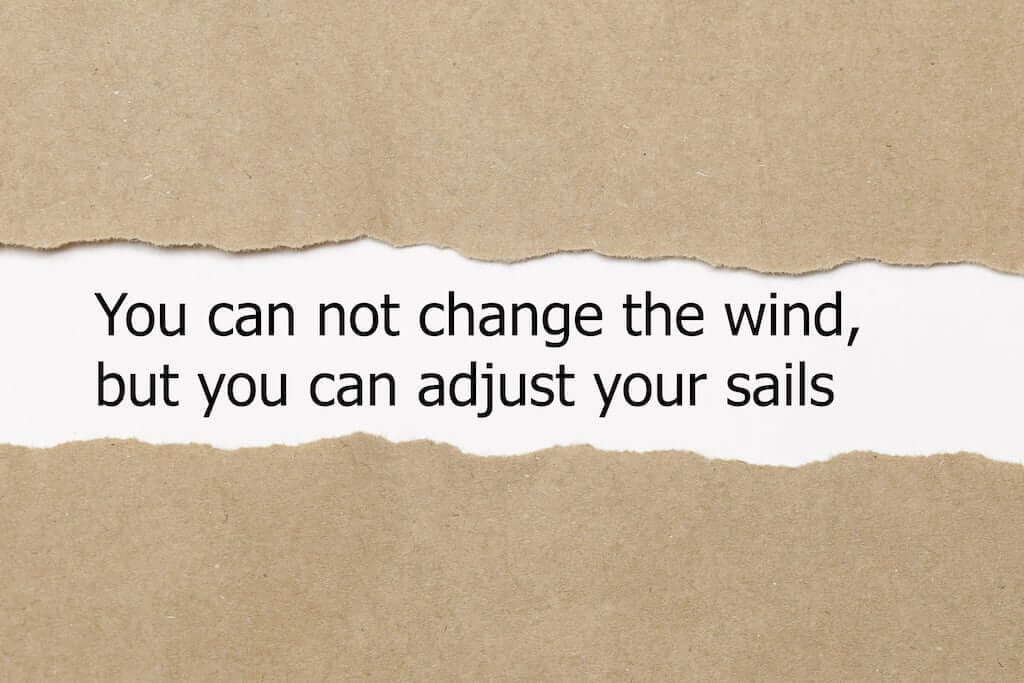Sustainable Caregiving Strategies
Strategy: Acceptance ~ When Winning is Losing
The conflicts that accompany caring for an aging parent can be unsettling. It may feel like we have been plopped back into the nest and our inner child has emerged to go into battle. The subject of the disagreement may seem minor or major such as driving or medicine management. These can be battles of epic proportions.

Our concern for safety can be perceived as a threat to independence. Two strategies can help us navigate conflicts, minimize stress, and maintain relationships. First, when we begin with the end in mind, as Steven Covey says, we can align our actions with our long term objectives. The second strategy requires a shift in perception and involves two steps. When we begin to look at the conflict from the other person’s point of view, we can manage our part of the discussion in a different manner and then possibly let go of some of our motivation to control the outcome.
“By far the best way to prevent a tug-of-war is to not pick up your end of the rope.”
Don Lancaster
Begin with the End in Mind:
What is the cost of winning vs the cost of losing? You make your point. It is heard, resented, and disregarded. What are the objectives of your caregiving journey? What is your goal? Your end game? Is your objective that your family member experience peace, feel supported? Is your goal for you to come through the experience healthy and whole? The time we spend on pushing against immovable objects is time lost on reaching our meaningful objectives.

“To begin with the end in mind means to start with a clear understanding of your destination. It means to know where you’re going so that you better understand where you are now and so that the steps you take are always in the right direction.”
Stephen R. Covey
You and your family member may be on differing paths, but when you realize your common objectives, the paths no longer feel like marches into battles. You are on the same team working toward the same outcome.
Possible objectives of a caregiving journey might be:
- Honor your caree’s wishes to age in place as long as possible
- Maintain independence
- Maintain dignity for both carer and caree
- Make health a priority
- Keep a life
- Find happiness in the present moment
- Recognize and let go of control
- Recognize and accept help
- Find appreciation and gratitude for the experience
- Have a record of the journey
New role, new perspective:
As you begin to take over more and more care responsibilities, your roles change. You are not parenting a child, but how do you define this new relationship that causes these strong uncomfortable emotions? You may feel like you are reliving the struggles of an adolescent and parent co-existing in a button-pushing, trigger minefield. It may be that you and your parent had a rewarding and validating adult relationship, but as you begin to offer advice and suggestions regarding their future, you no longer feel as if you are respected. You offer advice and it is rejected, leaving you feeling frustrated. It is deeply hurtful when we realize that we still seek approval, we know we deserve it and we feel dismissed as if we were still a child. It is necessary that the ego stand down in order to achieve the desired result, a win-win outcome.
The ego:
David Burns author of Feeling Good Together: The Secret to Making Troubled Relationships Work uses cognitive interpersonal therapy to help people get along better. In a podcast, the author said that in therapy settings he found that the majority of people didn’t truly want to get along. The conflict served them more than harmony. When our ego is dominating the relationship and is determined to be right, the ego is the only winner in the end (in other words, there are no real winners).
Words matter:
David Solie, in How to Say It to Seniors, provides much insight into why conversations can be unnecessarily controversial when we don’t understand what is behind the resistance and how our words are inciting fear and anger. Simply the verbs we use can dramatically change the dynamic of the conversation and the outcome.
Relinquish control:
- How Not to Say It: “Dad, Dr. Smith has been following you for years. If he says it’s time to retest you, then that’s what you need to do.”
- How to Say It: “Dad, I understand your desire to control the number of tests you take. You may change your mind in a few days, and whenever you give us the go-ahead, we’ll direct the doctor to schedule the tests he says you need.”
Be curious:
- How Not to Say It: “What do you mean you don’t want to go? I went through a lot of trouble to get these tickets.”
- How to Say It: “You seem hesitant about using these tickets. Why?”
Simple changes in our words and our tone can help us get to win/win. When we express empathy and relinquish control, we are also acknowledging the many losses that our parent has experienced and at this stage in life, helping them meet one of their basic needs which is to maintain control.
Verbs matter:
An excerpt from David Solie’s book, How to Say it to Seniors
The Right Verb versus the Wrong Verb
Control, direct, guide, lead, manage, organize, run. If we compare those action control-focused verbs to verbs such as transfer, grant, give, and assign, what do we have? To those citizens born in the Depression, who later had to sacrifice family and prosperity during the fierce World War II years, and then had to rebuild their lives and raise their families by scrimping and saving and investing wisely, the second set of verbs sounds like “free.” Particularly in the financial-planning arena, verbs like “transfer” and “assign” are alien notions to senior adults and go against their developmental agendas. This is the generation that Tom Brokaw writes about in The Greatest Generation. As a group, they worked hard for everything they have. They usually resist the notion of giving anything to anyone who hasn’t earned it. Avoid such verbs.
David Solie
We all win:
Caring for a family member is challenging. It is easy to get caught up in the conflict and feel like we are in a competition with a winner and a loser. We can all win when we play the game with intention and compassion. When we accept that our parent is an adult, free to make his or her own decisions, we deflate the built-up pressure and the stress from the conflicts. We can also accept that certain decisions may produce consequences that impact the whole family, and at that point, we will deal with that new reality.
Seamless Practice

Reflect:
- What losses has your family member experienced?
- How do you think those losses influence current behavior?
- Think of the last conflict with your care recipient. Did winning this battle help you achieve your objectives or did it derail your momentum toward your objectives?
- What might you have done differently to achieve a win/win outcome?
Journal:
- Write out your objectives for your caregiving journey.
- In what ways might you be wrestling for control? What would happen if you shed the battle armor?
- How would it be to no longer feel stress over the battles?


Apply:
- The next time a conflict arises, take a minute before responding. Think about your journey objectives. Think about the significance of this conflict in the scope of the journey.
- Begin to re-word requests and suggestions using the verbs recommended by David Solie.
- Continue to lighten the caregiving load by identifying opportunities to share the tasks.
